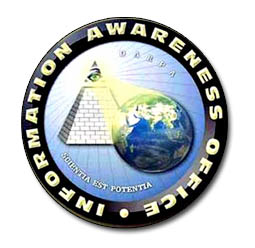Internet Censorship - Total Information Awareness
by Wayne Madsen - 12-9-5
 Internet censorship. It did not happen overnight but slowly came to America's
shores from testing grounds in China and the Middle East.
Internet censorship. It did not happen overnight but slowly came to America's
shores from testing grounds in China and the Middle East.
Progressive and investigative journalist web site administrators are beginning
to talk to each other about it, e-mail users are beginning to understand why
their e-mail is being disrupted by it, major search engines appear to be
complying with it, and the low to equal signal-to-noise ratio of legitimate
e-mail and spam appears to be perpetuated by it.
In this case, "it," is what privacy and computer experts have long warned about:
massive censorship of the web on a nationwide and global scale. For many years,
the web has been heavily censored in countries around the world. That censorship
continues at this very moment. Now it is happening right here in America.
The agreement by the Congress to extend an enhanced Patriot Act for another four
years will permit the political enforcers of the Bush administration, who use law
enforcement as their proxies, to further clamp censorship controls on the
web.
Internet Censorship: The Warning Signs Were Not Hidden
The warning signs for the crackdown on the web have been with us for over a
decade. The Clipper chip controversy of the 90s, John Poindexter's Total
Information Awareness (TIA) system pushed in the aftermath of 9-11, backroom
deals between the Federal government and the Internet service industry, and the
Patriot Act have ushered in a new era of Internet censorship, something just half
a decade ago computer programmers averred was impossible given the nature of the
web. They were wrong, dead wrong.
Take for example of what recently occurred when two journalists were taking on
the phone about a story that appeared on Google News. The story was about a
Christian fundamentalist move in Congress to use U.S. military force in Sudan to
end genocide in Darfur. The story appeared on the English Google News site in
Qatar. But the very same Google News site when accessed simultaneously in
Washington, DC failed to show the article. This censorship is accomplished by
geolocation filtering: the restriction or modifying of web content based on the
geographical region of the user. In addition to countries, such filtering can now
be implemented for states, cities, and even individual IP addresses.
With reports in the Swedish newspaper Svensa Dagbladet today that the United
States has transmitted a Homeland Security Department "no fly" list of 80,000
suspected terrorists to airport authorities around the world, it is not
unreasonable that a "no [or restricted] surfing/emailing" list has been
transmitted to Internet Service Providers around the world. The systematic
disruptions of web sites and email strongly suggests that such a list
exists.
News reports on CIA prisoner flights and secret prisons are disappearing from
Google and other search engines like Alltheweb as fast as they appear. Here now,
gone tomorrow is the name of the game.
Google is systematically failing to list and link to articles that contain
explosive information about the Bush administration, the war in Iraq, Al Qaeda,
and U.S. political scandals. But Google is not alone in working closely to stifle
Internet discourse. America On Line, Microsoft, Yahoo and others are slowly
turning the Internet into an information superhighway dominated by barricades,
toll booths, off-ramps that lead to dead ends, choke points, and security
checks.
America On Line is the most egregious is stifling Internet freedom. A former AOL
employee noted how AOL and other Internet Service Providers cooperate with the
Bush administration in censoring email. The Patriot Act gave federal agencies the
power to review information to the packet level and AOL was directed by agencies
like the FBI to do more than sniff the subject line. The AOL term of service
(TOS) has gradually been expanded to grant AOL virtually universal power
regarding information. Many AOL users are likely unaware of the elastic clause,
which says they will be bound by the current TOS and any TOS revisions which AOL
may elect at any time in the future. Essentially, AOL users once agreed to allow
the censorship and non-delivery of their email.
Microsoft has similar requirements for Hotmail as do Yahoo and Google
for their respective e-mail services.
There are also many cases of Google's search engine failing to list and link to
certain information. According to a number of web site administrators who carry
anti-Bush political content, this situation has become more pronounced in the
last month. In addition, many web site administrators are reporting a dramatic
drop-off in hits to their sites, according to their web statistic analyzers.
Adding to their woes is the frequency at which spam viruses are being spoofed as
coming from their web site addresses.
Government disruption of the political side of the web can easily be hidden amid
hyped mainstream news media reports of the latest "boutique" viruses and worms,
reports that have more to do with the sales of anti-virus software and services
than actual long-term disruption of banks, utilities, or airlines.

Internet Censorship in the US: No Longer a Prediction.
Google, Microsoft, Yahoo, and Cisco Systems have honed their skills at Internet
censorship for years in places like China, Jordan, Tunisia, Saudi Arabia, the
United Arab Emirates, Vietnam, and other countries. They have learned well. They
will be the last to admit they have imported their censorship skills into the
United States at the behest of the Bush regime. Last year, the Bush-Cheney
campaign blocked international access to its web site -- www.georgewbush.com --
for unspecified "security reasons."
Only those in the Federal bureaucracy and the companies involved are in a
position to know what deals have been made and how extensive Internet censorship
has become. They owe full disclosure to their customers and their fellow
citizens.
http://waynemadsenreport.com/
The internet nanny is cute ...
... until she confiscates your computer and hauls you away and locks you up for a
couple of years on trumped up charges relating to national
security leaking national secrets . and then you realize she.s a hard
ass. Inspired by the hideous and tacky mascots of the Beijing
Olympics, the Shenzhen police devised a way of making their new internet police
force (which started work on January 1 of this year) seem more cute and
acceptable to the masses . using cartoon mascots of their own. One is named Jing
Jing (the male), and the other Cha Cha (the female). .Jing. and .cha. are the
characters that comprise the word for .police. in Chinese. Shanghaiist is sure
that some of you readers are no doubt Westerners that just don.t get China and
Chinese values, which is why the po-lice have to spell it
out for you:
????????? ????????“????”,??????????????,???????????
This basically states that websites, including BBSs, discussion groups (and most definitely blogs) are public places, and so internet denizens must likewise watch what they say and do. Thus the two cartoon figures will appear on various Shenzhen sites from now on. Apparently, you can click on either one and then be brought to a page (here or here) where you can talk live with real cops. One of the interesting things about these cartoon cops is that people have expressed the feeling that Jing Jing and Cha Cha look just too darn cute, and that no internet bad boys are going to be thinking about what they gonna do when these cartoon cops come for you. To learn more, read an English report here. There is something we don.t get, though: Why is it that Cha Cha has those marks under her doe eyes that indicate she.s a she, while neither she nor Jing Jing even has a f*cking nose? Anyway, we.d definitely pay more attention to her if she looked like, say, Jessica Rabbit . but we digress. You won.t find these two at your local donut shop . they.re hard at work on many sites, like on the right side of this webpage. Click on the icon and it.ll take you to yet another page where you can then go to the links we gave above where you can talk with real coppers. We.ve been unsuccessful at actually getting someone thus far. It could be that there are just too many people out there dying to talk to an internet cop about T1betan independence, official corruption, human rights violations, heroin and gay sex.

China: Web censorship gives US pause for thought (silicon.com)
How China Controls the Internet (Business Week)
Anonymizer's new anti-filter service for China netizens
Anonymizer launched a new project called "Operation Anti-Censorship" last week -- free privacy software to help Chinese citizens circumvent government-issue Web filters. Snip from product launch announcement:
In addition, the new solution protects users from detection, persecution, and retribution by shielding their personal identities and related information that the Chinese government is currently able to monitor. The site that currently hosts the software download is www.xifuchun.com, however please note that this URL will be changed on a regular basis to avoid blocking by the Chinese government. Anonymizer relies on early adopters to share the regularly changing URLs with their friends and family members so the number of people able to safely access the Internet continues to grow.
Also: Website censorship in Thailand
US plans to 'fight the net' revealed
by Adam Brookes - BBC Pentagon
correspondent
27 January 2006
Information
Operations Roadmap The document says information is "critical to
military success"
 Bloggers beware.
Bloggers beware.
As the world turns networked, the Pentagon is calculating the military
opportunities that computer networks, wireless technologies and the modern media
offer.
From influencing public opinion through new media to designing "computer network
attack" weapons, the US military is learning to fight an electronic war.
The declassified document is called "Information Operations Roadmap". It was
obtained by the National Security Archive at George Washington University using
the Freedom of Information Act.
Officials in the Pentagon wrote it in 2003. The Secretary of Defense, Donald
Rumsfeld, signed it.
The "roadmap" calls for a far-reaching overhaul of the military's ability to
conduct information operations and electronic warfare. And, in some detail, it
makes recommendations for how the US armed forces should think about this new,
virtual warfare.
The document says that information is "critical to military success". Computer
and telecommunications networks are of vital operational importance.
Propaganda
The operations described in the document include a surprising range of military activities: public affairs officers who brief journalists, psychological operations troops who try to manipulate the thoughts and beliefs of an enemy, computer network attack specialists who seek to destroy enemy networks.
All these are engaged in information operations.
Perhaps the most startling aspect of the roadmap is its acknowledgement that information put out as part of the military's psychological operations, or Psyops, is finding its way onto the computer and television screens of ordinary Americans.
"Information intended for foreign audiences, including public diplomacy and
Psyops, is increasingly consumed by our domestic audience," it reads.
"Psyops messages will often be replayed by the news media for much larger
audiences, including the American public," it goes on.
The document's authors acknowledge that American news media should not
unwittingly broadcast military propaganda. "Specific boundaries should be
established," they write. But they don't seem to explain how.
"In this day and age it is impossible to prevent stories that are fed abroad as
part of psychological operations propaganda from blowing back into the United
States - even though they were directed abroad," says Kristin Adair of the
National Security Archive.
Credibility problem
Public awareness of the US military's information operations is low, but it's
growing - thanks to some operational clumsiness.
When it describes plans for electronic warfare, or EW, the document takes on an
extraordinary tone. It seems to see the internet as being equivalent to an enemy
weapons system
Late last year, it emerged that the Pentagon had paid a private company, the
Lincoln Group, to plant hundreds of stories in Iraqi newspapers. The stories -
all supportive of US policy - were written by military personnel and then placed
in Iraqi publications.
And websites that appeared to be information sites on the politics of Africa and
the Balkans were found to be run by the Pentagon.
But the true extent of the Pentagon's information operations, how they work, who
they're aimed at, and at what point they turn from informing the public to
influencing populations, is far from clear.
The roadmap, however, gives a flavour of what the US military is up to - and the
grand scale on which it's thinking.
It reveals that Psyops personnel "support" the American government's
international broadcasting. It singles out TV Marti - a station which broadcasts
to Cuba - as receiving such support.
It recommends that a global website be established that supports America's
strategic objectives. But no American diplomats here, thank you. The website
would use content from "third parties with greater credibility to foreign
audiences than US officials".
It also recommends that Psyops personnel should consider a range of technologies
to disseminate propaganda in enemy territory: unmanned aerial vehicles,
"miniaturized, scatterable public address systems", wireless devices, cellular
phones and the internet.
'Fight the net'
When it describes plans for electronic warfare, or EW, the document takes on an
extraordinary tone.
It seems to see the internet as being equivalent to an enemy weapons
system.
"Strategy should be based on the premise that the Department [of Defense] will
'fight the net' as it would an enemy weapons system," it reads.
The slogan "fight the net" appears several times throughout the roadmap.
The authors warn that US networks are very vulnerable to attack by hackers,
enemies seeking to disable them, or spies looking for intelligence.
"Networks are growing faster than we can defend them... Attack sophistication is
increasing... Number of events is increasing."
US digital ambition
And, in a grand finale, the document recommends that the United States should
seek the ability to "provide maximum control of the entire electromagnetic
spectrum".
US forces should be able to "disrupt or destroy the full spectrum of globally
emerging communications systems, sensors, and weapons systems dependent on the
electromagnetic spectrum"
Consider that for a moment.
The US military seeks the capability to knock out every telephone, every
networked computer, every radar system on the planet.
Are these plans the pipe dreams of self-aggrandising bureaucrats? Or are they
real?
The fact that the "Information Operations Roadmap" is approved by the Secretary
of Defense suggests that these plans are taken very seriously indeed in the
Pentagon.
And that the scale and grandeur of the digital revolution is matched only by the
US military's ambitions for it.
Quotes:
The only valid censorship of ideas is the right of people not to listen.
~ Tommy Smothers
The peculiar evil of silencing the expression of an opinion is, that it is
robbing the human race; posterity as well as the existing generation; those who
dissent from the opinion, still more than those who hold it. If the opinion is
right, they are deprived of the opportunity of exchanging error for truth: if
wrong, they lose, what is almost as great a benefit, the clearer perception and
livelier impression of truth, produced by its collision with error.
~ John Stuart Mill, On Liberty, 1859
Disclaimer



